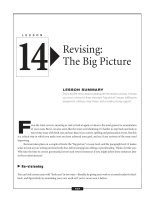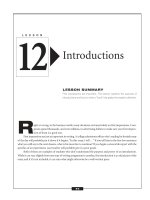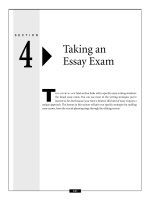Write Better Essays - Editing
Bạn đang xem bản rút gọn của tài liệu. Xem và tải ngay bản đầy đủ của tài liệu tại đây (145.67 KB, 19 trang )
T
o edit your essay effectively, you’ll need to read each paragraph a number of times, paying careful atten-
tion to your sentences and the words that comprise them. While some students edit well on the com-
puter, many others work better on a hard copy. Unlike revising, which entails the possible reworking
of large parts of your essay, editing is a word-by-word and sentence-by-sentence task. Taking pen to paper may
help you focus more closely on the pieces that make up your essay, rather than the work as a whole.
As you read the hard copy of your essay, pen in hand, ask yourself the following questions. Circle any prob-
lems as you encounter them. You might also want to make a quick note in the margin with an idea or two about
how to improve the problem(s).
■
Are unnecessary words and phrases cluttering up your sentences?
■
Do you repeat yourself? Rework your point so that you say it well the first time, and remove any repetitious
words and phrases.
■
Are there any clichés, pretentious language, or confusing jargon?
■
Do you use the active voice whenever possible?
■
Do you avoid using ambiguous words and phrases?
LESSON
Editing
LESSON SUMMARY
Editing takes a closer look at your writing, through a stronger lens that
highlights words and sentences. Are your word choices clear and
direct? Are there any repetitive or awkward sentences or phrases?
When you edit, you can clean up and clear up words and sentences
to make them better convey your intended meaning and easier to
understand.
16
121
WORDY REPLACE WITH
a lot of many or much
all of a sudden suddenly
along the lines of like, such as
are able to can
as a matter of fact in fact, or Delete
as a person Delete
■
Are verb tenses consistent?
■
Is the antecedent for every pronoun clear?
■
Do you use precise adjectives and adverbs?
■
Is your sentence structure varied? Sentences should not be the same length, nor should they be repetitive in
any other way, such as all beginning with a noun, followed by a verb, followed by an object.
After you’ve read your essay a few times and highlighted any areas that need improving, focus on one problem at
a time.
Be Concise
Why use ten words to get across a meaning that could be better said in five? Those ten words will definitely waste
your reader’s time and probably confuse the point you’re trying to make. Many of the words and phrases that fol-
low are both well known and, unfortunately, well used. They don’t convey meaning, and are therefore unneces-
sary. The following are three of the worst offenders, with usage examples.
1. Because of the fact that. In most cases, just because will do.
Because of the fact that he was late, he missed his flight.
Because he was late, he missed his flight.
2. That and which phrases. Eliminate them by turning the idea in the that or which phrase into an adjective.
These were directions that were well written.
These directions were well written.
3. That by itself is a word that often clutters sentences unnecessarily, as in the following example:
The newscaster said that there was a good chance that election turnout would be low and that it could
result in a defeat for our candidate.
The newscaster said there was a good chance election turnout would be low and could result in a defeat for
our candidate.
–EDITING–
122
Word Choices for Concise Writing
WORDY REPLACE WITH
as a whole Delete
as the case may be Delete
at the present time currently or now
both of these both
by and large Delete
by definition Delete
due to the fact that because
for all intents and purposes Delete
has a tendency to often or Delete
has the ability to can
in order to to
in the event that if
in the near future soon
is able to can
it is clear that Delete
last but not least finally
on a daily basis daily
on account of the fact that because
particular Delete
somewhere in the neighborhood of about, around
take action act
the fact that that, or Delete
the majority of most
the reason why the reason or why
through the use of through
with regard to about or regarding
with the exception of except for
123
Word Choices for Concise Writing
(continued)
Wordy and Concise Sentences
Wordy: The students were given detention on account of the fact that they didn’t show up for class.
Concise: The students were given detention because they didn’t show up for class.
Wordy: Everyone who has the ability to donate time to a charity should do so.
Concise: Everyone who can donate time to a charity should.
Wordy: In a situation in which a replacement for the guidance counselor who is retiring is found, it is
important that our student committee be notified.
Concise: When a replacement for the retiring guidance counselor is found, our student committee must
be notified.
Avoid Unnecessary Repetition
Unnecessary repetition is a sign of sloppy writing. It’s easy to repeat the same thing, varying it slightly each time.
It’s harder to say something well once, and then write about your next idea or example. Repetition also wastes valu-
able time and space. If you are writing while the clock is ticking, or are limited to a number of words or pages,
say it right the first time and move on.
For example:
Repetitive: They met at 4
P
.
M
. in the afternoon.
Concise: They met at 4
P
.
M
.
P
.
M
. means in the afternoon, so there’s no reason to say in the afternoon. It’s a waste of words and the
reader’s time.
Repetition can be found even in short phrases. The list that follows contains dozens of such phrases that can
clutter your essay. Most of them contain a specific word and its more general category. Why state both? The word
memories can only refer to the past, so you don’t need to say past memories. We know that blue is a color, so describ-
ing something as blue in color is repetitive and therefore unnecessary. In most cases, you can correct the redun-
dant phrase by dropping the category and retaining the specific word.
Some of the phrases use a modifier that is unneeded, because the specific is implied in the general. For
instance, the word consensus means general agreement. Therefore, modifying it with the word general is repeti-
tive. Similarly, mathematics is a field of study, so it does not need to be modified with the word field. You can tighten
up your writing, saying it well one time, by eliminating wordiness.
–EDITING–
124
RETAIN ONLY THE FIRST WORD DROP THE MODIFIER (FIRST WORD)
any and all odd in appearance past memories terrible tragedy
first and foremost mathematics field final
destination end result
refer back cheap quality general
consensus final outcome
close proximity honest in character various
differences free gift
large in size confused state each
individual past history
often times modern in design basic
fundamentals totally obvious
reason why unusual in nature true facts rarely ever
heavy in weight extreme in degree important
essentials unexpected surprise
period in time strange type future plans sudden crisis
round in shape
Avoid Overly Informal and Overused Language
Words and phrases that are too formal, too obscure, or overused don’t belong in your essay.
■
Vulgarisms
The last thing you want to do is turn off or offend your reader. Since it’s difficult to know what kinds of lan-
guage your audience may find offensive or in poor taste, err on the side of caution by not including any lan-
guage considered even mildly obscene, gross, or otherwise offensive. This includes scatological and sexual
terms, and words such as butt (as in “I worked my butt off”), hell (as in “hotter than hell”), God (as in “oh,
God!”), and damn.
■
Clichés
Clichés should be avoided not only because they are too informal, but also because they are overused. Your
writing must be in your own voice, without relying on stale phrases such as one step at a time; no news is
good news; have a nice day; when life gives you lemons, make lemonade; and no guts, no glory.
■
Slang
Slang is nonstandard English. Its significance is typically far removed from either a word’s denotative or con-
notative meaning, and is particular to certain groups (therefore, it excludes some readers who won’t under-
stand it). Examples include blow off, canned, no sweat, and thumbs down (or up). It is also inappropriate and
offensive to use slang terms for racial or religious groups.
■
Buzzwords
Buzzwords are a type of slang. They’re words (real or made up) that take the place of simpler, more direct words.
They are, at best, pompous, and at worst, confusing. And, like other forms of slang, buzzwords don’t belong in
your essays. Examples include resultful (gets results), suboptimal (not the best), guesstimate (estimate), requi-
site (necessary), potentiality (potential), and facilitate (help).
–EDITING–
125
■
Technobabble
Don’t assume your audience shares your interests or familiarity with technology; write instead for a reader
who has a broad knowledge base that is not expert in any subject. That means explaining anything your
reader might not be familiar with, without talking down. Examples include ISP (Internet Service Provider),
screenagers (teens who are online), mouse potato (technology’s answer to the couch potato), and I-way
(information superhighway).
Use the Active Voice
Verbs have two voices. In the active voice, the subject is the source of, or cause of, the action. In the passive voice,
the subject is acted upon. In a personal essay, you are usually the subject. That means the active voice is much more
effective in conveying your personality through your essay—you’re the “actor,” not the “acted upon.” The active
voice is also clearer and more direct. In the following examples, note the simplicity and directness of the first sen-
tence in each pair. The second sentences, written in the passive voice, are clunky and noticeably longer.
Compare:
My friend asked for another helping.
Another helping was asked for by my friend.
I misplaced my wallet.
My wallet was misplaced by me.
The administration has selected three finalists for the open position.
Three finalists for the open position have been selected by the administration.
126
Big words won’t win points with your readers. Aim to sound like yourself, not to impress with your knowledge
of ten-letter words. Here are three reasons to stop looking for and using so-called big words.
1. They sound pretentious (you’re supposed to sound like you, not a politician or chairman of the board).
2. They can sound ridiculous (by using words that are not in your normal vocabulary, you run the risk of using
them incorrectly).
3. They may appear as a “tactic” (your reader might think you are trying to add weight with words because
you are worried your essay isn’t well written or that your ideas aren’t worth reading).
To the point: I decided to keep it simple by packing only those things that I could carry in one suitcase.
Thesaurized:
I determined to eschew obfuscation by packing only those things that I could transport in one valise.
To the point: At my summer job, I had the chance to learn about Information Technology as it relates to
engineering.
Thesaurized: At my summer employment, I had the fortuity to obtain IT-related information as it pertains to the
engineering field.
Think Twice before Opening Your Thesaurus
Ambiguous: When doing the laundry, the phone rang.
Clear: The phone rang when I was doing the laundry.
Ambiguous: She almost waited an hour for her friend.
Clear: She waited almost an hour for her friend.
Ambiguous: I told her I’d give her a ring tomorrow.
Clear: I told her I’d call her tomorrow.
Ambiguous: A speeding motorist hit a student who was jogging through the park in her blue sedan.
Clear: A speeding motorist in a blue sedan hit a student who was jogging through the park.
Correcting Ambiguous Language
Avoid Ambiguity
Ambiguous means having two or more possible meanings. Ambiguous language can either be words and phrases
that have more than one meaning, or word order that conveys a meaning different from the one intended by the
writer:
The quarterback liked to tackle his problems.
This sentence can be read two ways: The quarterback likes to deal with his problems, or his problems are his oppo-
nents on the field whom he grabs and knocks down. This kind of confusion can happen whenever a word has more
than one possible meaning. The quarterback liked to address his problems is a better sentence, and is unlikely to be
misunderstood.
My advisor proofread my essay with the red sports car.
Here, the word order of the sentence, not an individual word, causes the confusion. Did the advisor proofread the
essay with his car? Because the phrase with the red sports car is in the wrong place, the meaning of the sentence is
unclear. Try instead: My advisor with the red sports car proofread my essay.
Clear Up Confusing Pronoun References
Pronouns (words such as I, we, them, and her) take the place of nouns. They should only be used when the noun
to which they refer (known as the antecedent) is obvious and meaningful. Check the pronouns in your writing
to be certain they are not one of the following:
■
unclear
■
too far from the antecedent
■
useless
–EDITING–
127









